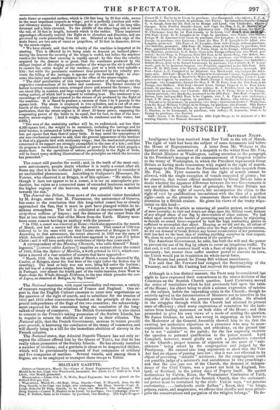POSTSCRIPT.
SATURDAY NIGHT.
Intelligence has been received from New York to the 4th of March. The right of visit bad been the subject of some documents laid before the House of Representatives. A letter from Mr. Webster to the Speaker states the substance of a despatch to the writer from Mr. Fox, the British Minister at Washington, calling attention to the paragraph in the President's message at the commencement of Congress relative to the treaty of Washington, in which the President represented Great Britain as having made concessions with regard to the right of search. A message to the House from the President refers to this despatch from Mr. Fox. Mr. Tyler reasserts that the right of search cannot be allowed, with the single exception of vessels suspected of piracy ; but he observes, that recent official declarations by Great Britain raise a doubt whether the apparent difference between the two Governments is not one of definition rather than of principle; for Great Britain not only disclaims the right of search, but accompanies the claim to the right of visit by qualifications inconsistent with the idea of a perfect right—such as the promise to remunerate those who suffer loss from detention by a British cruiser. He gives his views of the treaty stipu- lation on this head- " I regarded the 8th article as removing all possible pretext, on the ground of mere necessity, to visit and detain our ships upon the African coast, because of any alleged abuse of our flag by slave-traders of other nations. We had taken upon ourselves the burden of preventing any such abuse, by stipulating to furnish an armed force—regarded by both the high contracting parties as sufficient to accomplish that object. Denying as we did and do, all colour of right to exercise any such general police over the flags of independent nations, we did not demand of Great Britain any formal renunciation of her pretension. Still less had we the least idea of yielding anything ourselves in that respect. We chose to make a practical settlement of the question."
The American Government, he adds, has both the will and the power to prevent the use of its flag by others to cover an iniquitous traffic. To that end, it will not content itself with a fleet of eighty guns, if more be necessary ; but, sooner than suffer another power to execute its laws, the Union would put in requisition its whole naval force.
The Senate had passed the Treaty Bill without amendment. It is said that Mr. Forward had resigned the Secretaryship of the Treasury, and that Mr. Cushing had received the appointment.


























 Previous page
Previous page